Here’s a truism that Facebook PR is not sure how to readily admit. There really aren’t 350 million members on Facebook. Take my husband’s grandfather as an example. He’s an 89-year-old guy who doesn’t really have his passwords all in the same place, nor does he have an acute sense of hearing to realize that when his grandchildren say “hey grandpa, I’m making a Facebook account for you!” he should respond with “Oh, I already have one.” Consequently, the guy has three Facebook profiles, all of which were created for him by three different members of his family.
Got any family members who boast more than one Facebook profile? You’re likely not alone. Now consider your industry. I have several friends who have both a personal profile and a business profile. These are users who like Facebook but find it rather difficult to merge the personal and professional into one cohesive online identity. I’m sure the internet marketing industry isn’t alone in this regard.
Let’s now consider the hundreds of profiles that you’ve seen that don’t identify a person at all. Surely you have been befriended by those people representing “WWW [yourdomainhere] COM” or “Green Seo.” These are individuals posing as entities who assume personal profiles. You know, Facebook actually prohibits these types of accounts in their Terms of Service, but Facebook’s staff doesn’t actually act upon these infractions, apparently. With over “350 million members” on Facebook, it’s too difficult to isolate all of the rule breakers.
These examples above illustrate a typical usability question faced by Facebook users (well, except for Grandpa). Despite the fact that Facebook has the most customizable privacy settings of all social networks (though we could argue with their effectiveness in a whole other post), people don’t like maintaining a “business” identity on the same profile as their “personal” (fun?) identity. As a result, relationship-building becomes a challenge.
The Facebook Friending Dilemma
One of the questions I get asked very often is how employees are supposed to cope with incoming friend requests from their clients, bosses, and individuals they have a working relationship with through their place of employ. While there’s no clearly defined rule (it’s a question of personal preference), I usually urge the person not to be resentful or offended if the relationship gets ported over to a professional network or other public space (such as a Facebook Fan page).
I actually practice what I preach.
See, I’m one of those Facebook users who have been on the service since February 2004, which is quite a long time considering Facebook was open to about three schools at the time that I signed up. Back then, my Facebook friends were mostly connected to me via my neighborhood through religious affiliations or though college or primary school. There were no business colleagues on my friends list.
In due time, that started to change as I built face-to-face relationships with co-workers and then started building friendships in the industry. It helped that Facebook became an open network that invited everyone in. It was both exciting because I could know more about my business partners but scary because I would have to start ignoring Facebook friend requests in order to be true to my reasons for being there: to build strong interpersonal relationships with people who I actually know and who really matter.
How I Use Facebook
Facebook, to me, is about maintaining real relationships. With every single individual I am connected to, I want to feel comfortable responding to a status message or a photo update. And if you’re my Facebook friend, you should feel comfortable doing the same. However, many people connect and forget. That’s not how I want to use the network, and that’s why I won’t accept your friend request.
A few weeks ago, jwz posted a great piece on how to access Facebook via a feed reader. To keep on top of friends’ happenings on the network, I subscribed to the relevant updates. I now have status updates in my feed, and finally, I can see both happy and sad news. It has helped strengthen that friendship bond; I can now easily keep in touch with friends and those who are serious about using the network to keep their peers in the know about what is happening to them every day.
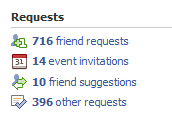 I posted about how I network on Facebook (among other networks), over two years ago, but I have over 700 pending Facebook friend requests from people I do not know. Many of these incoming friend requests (with the exception of possibly 0.05% of the requests) have no introduction, which I personally find a social media etiquette misstep — especially when I have no idea who you are. For the others who took the effort to connect, I am thankful that you thought of me, but if I don’t know you, I hope to get to know you in the future. We’re just not there yet.
I posted about how I network on Facebook (among other networks), over two years ago, but I have over 700 pending Facebook friend requests from people I do not know. Many of these incoming friend requests (with the exception of possibly 0.05% of the requests) have no introduction, which I personally find a social media etiquette misstep — especially when I have no idea who you are. For the others who took the effort to connect, I am thankful that you thought of me, but if I don’t know you, I hope to get to know you in the future. We’re just not there yet.
Much has changed in the last 2 years. I’m now constantly neck-deep in social media projects, am working with amazing people, and I’m passionate about the people I work with and the work I do. Facebook has become more open than ever and everyone has decided to join. In fact, I noticed substantial changes in my friendships on Facebook, so I decided to update the Facebook charts I prepared in 2007 to provide an updated look of my friendship breakdown for January 2010.
As I prepared these charts, I unfriended a handful (52) of Facebook friends, especially some who befriended me when I was more accepting of Facebook relationships (before it was saturated with people I didn’t know). Why? We never got to know each other, and nothing happened after that initial friend request. Facebook has facilities that help foster real friendships, and when these facilities are ignored in the context of the friendship, the relationship does not feel genuine. If you befriended me in the last 2-3 years and have done absolutely nothing to maintain that friendship, you were axed. It’s not you and it’s not me; it’s us. There was nothing between us and the relationship dissolved.
Today, my 1,508 Facebook connections are broken into the following categories:
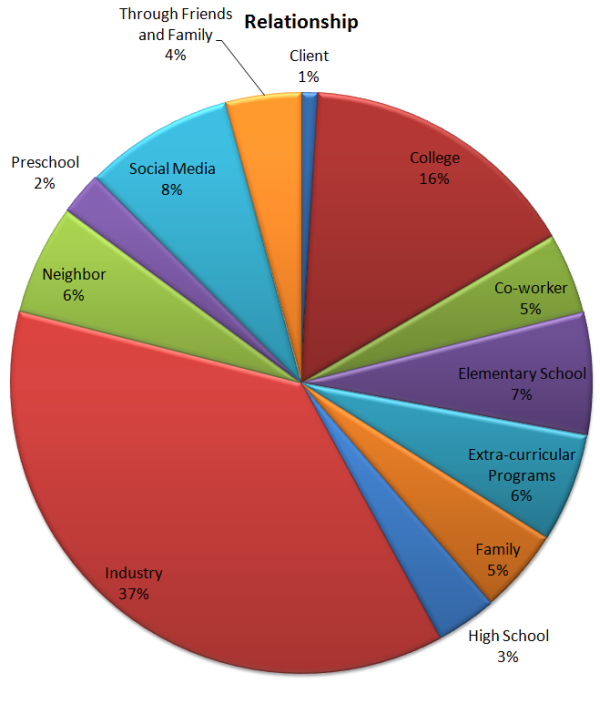
- Extra-curricular Programs refer to friends I met on vacation, through summer programs, or though other related activities.
- Neighbor typically refers to those living nearby but may also be affiliated through religious organizations.
- Industry and social media connections are further broken into additional categories, as seen in the charts below.
Consider the difference between my friendship circle in 2007 (graph featured below).
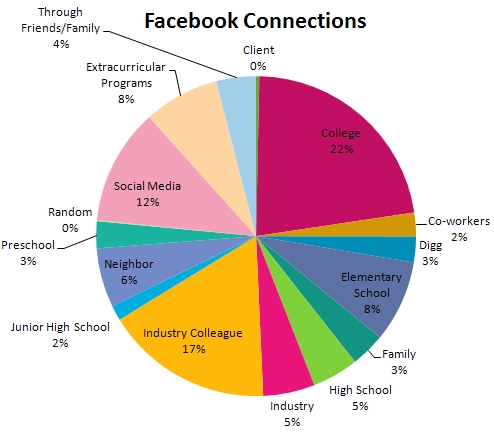
My industry (internet marketing/blogging) connections (who are 99.7% of my pending friend requests) have saturated the space, and more of my co-workers have signed up. (It might just be that I’ve been able to work with more amazing people.) I removed all my “Random” connections for reasons specified earlier. Digg is now part of social media and will be explained in the final chart.
Let’s look at the industry and social media subcategories. First, here’s the breakdown of industry colleagues that I currently have on Facebook.
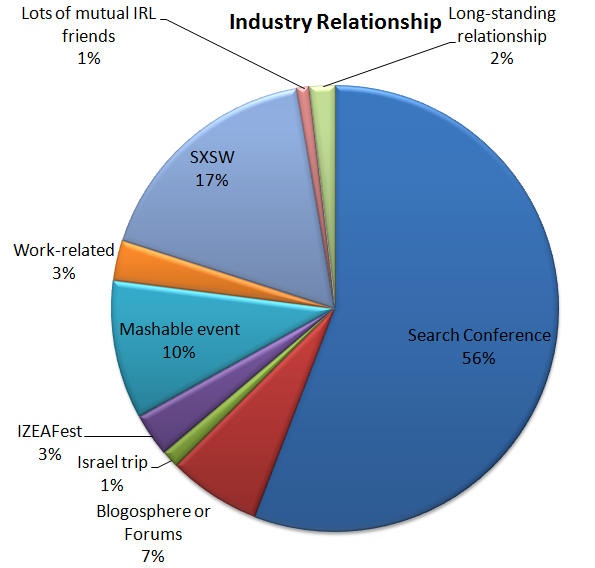
As you can see in the chart above, I further broke down my Industry peers to explain the origination of these friendships.
- Some of these friends have mutual real-life friends (outside typical industry connections).
- Many of them (more than half) were individuals I met at search conferences, but other conferences (SXSW, events that Mashable was involved in in the capacity of host or media sponsor, and the first IZEAFest) also represented my Industry connections. With regards to Search Conference, I refer to Search Marketing Expo, PubCon, and Search Engine Strategies, but I also met a few people at Affiliate Summit.
- Some friendships originated through work-related communications that lasted a long period of time, so a relationship developed, was enhanced, and was solidified with the acceptance of a friend request.
- Other industry connections that have simply flourished since the very “early days” of social media. I may have met these individuals by chance (long-standing relationship) or through the blogosphere or forums.
In nearly all of these cases, I have met my friends face-to-face.

The chart above illustrates the breakdown of the “social media” friends. These are friends who have no direct ties to the industry, but in using social networks, we’ve formed close bonds and friendships.
- Digg is by far the largest; as a former “top user” of the service, I built strong relationships with employees and users of the social news site.
- There were other typical social networks in this grouping as well, including Flickr, FriendFeed, Kirtsy, Mixx, Plurk, StumbleUpon, Tip’d, and Twitter.
- I also consider bloggers who have forged real-life relationships with me to have connected via social media. This is different from forums/blogosphere of the previous chart because they are not connected to me in the search marketing or social media capacity.
- Both “IRC” and “Forums” that I reference relate in this chart to the pre-social media days. And yes, IRC does refer to Internet Relay Chat.
- In the early 90s, I was involved with AOL both as remote staff and as a participant, so I still maintain friendships that originated from these old hubs.
- (In case you’re wondering who Craigslist is, he’s a guy I sold an elliptical trainer to a few years ago. It turns out that we have several mutual real-life friends.)
These friendships are a mix of people I’ve met face-to-face but also consist of individuals I have just communicated with for such a long time that we’ll easily hit it off when we actually meet in person. There are only a small number of individuals I have not met in person on this list.
As you can see by the breakdown, Facebook is about real relationships, and when I look at your name, I want be able to justify that friendship. Facebook is an extension of the real world in the virtual space.
Evaluate Your Connections
Knowing who someone is when seeing their profile without having to look at their place of employment or common friends is important. If you have Facebook friends that you can’t place from a hole in the wall, it might be a good idea to purge. It’s totally up to you.
When you connect with someone on Facebook, ask yourself, What do these online connections signify? Are you establishing a friendship so that you will do something with this individual in the future, or are you simply establishing a friendship just because you can?
Why LinkedIn Makes More Sense than Facebook
If the prospect of friendship makes you feel antsy, especially from individuals you are not comfortable letting in, it’s not awkward or rude to suggest that the online relationship be established elsewhere. LinkedIn is the likely choice because it is a “set it and forget it” social network. There’s not much you can do with the connection once it’s confirmed. On LinkedIn, once you’re connected, that’s usually it. Someone might request a recommendation of you or contact you via messaging facilities, but you can’t do much to deface update your colleague’s profile or build upon that relationship in the confines of the social network.
On Facebook, however, there are hundreds of opportunities to upload pictures, comment on statuses, tag people in notes — and yet, among business professionals (outside of overt “no-no” marketing tactics spam), that kind of activity is typically ignored. Many business people just don’t do anything with Facebook with their business colleagues. That’s why I consider Facebook a personal network for real friends. Knowing someone online (or offline) doesn’t grant you an “in” to their personal space.
If You Insist Upon Using Facebook
Let’s face it. Facebook has its pros. (LinkedIn does too, and it’s a terrific professional network.) I’ve decided to create a public Facebook page to be updated regularly that broadcasts what business colleagues are often looking at me for anyway: social media news. The public page is one of two Facebook pages (the latter being for my book) that I plan to maintain to share fun social media information and tidbits. The profiles will both feature different stories — and they won’t be about me.
For a little bit of history, I created a fan page for myself when Facebook first launched its Fan pages. It was an experiment in personal branding and a way to have fun to connect with people I otherwise may never know. The page mostly was stagnant for awhile, but after Facebook’s page redesigned that made it look like I was talking to myself, I decided to kick it up a notch. Neil Patel provided several compelling reasons as to why I should. I recently invited some actual Facebook friends who I thought would find the information therein interesting — I hope you saw it as a way to connect in the professional sense (and nothing else — thank you Curtis) 🙂
I must emphasize that my Facebook page is not about me, but it addresses this age-old debate about how to — within Facebook’s Terms of Service — handle the personal and the professional. Since most people who want to connect with me on Facebook know me in a more professional capacity, I will be using my Facebook page to engage them professionally. (As it is, my personal page is mostly about my kid anyway. Would you really comment on those updates? Sure, some of you might…)
Looking Ahead
If I don’t connect with you right now, don’t take it personally. One day, I hope to meet every single person who added me as a Facebook friend in the last few years (and those who continue to do so) face to face. I want to put a face to a name and build a relationship that will last. Those are my goals for my current set of friends and I hold everyone to the same expectations. All friend requests will remain open indefinitely, because I’m hoping one day to get to seal the deal and make the friendship a reality.
Until then, connect with me on LinkedIn or on my Facebook page. I’d be honored to have you join me.


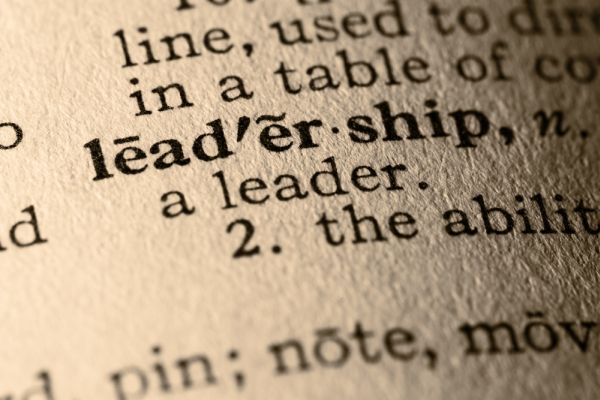

Tamar,
I love your concept but disagree with using Linkedin as a potential solution. First Linkedin is suppose to be a trusted network of contacts so if you fill it with people you only sort of know you are using it differently then it was intended.
But setting that aside since users will use things as they see fit for their needs, you do actually create a situation which might harm those in your network by using Linkedin in this way.
You see when a 1st degree connection contact request to reach a 3rd degree connection through you, you do not have the option of who to send the request on through. You must send these message through the person in your network with the most connections and if this turns out to be a person you met once but have no relationship with that person may turn into a determent to your 1st degree connections request.
Linkedin is not an open networking tool and casual use of it devalues the system and your network within it.
Your suggestion to use a personal website is better or I suggest open social networking tools like Twitter, Friend Feed, Facebook Fan Page or some other tool that does not present itself as a trusted network would be the best choice.
Hey Joel –
Woohoo! I love that you mentioned that. You’re absolutely right with regards to the intentions of LinkedIn and it’s something I grappled with for awhile. In fact, people who don’t know you and don’t trust you might get you penalized from the service.
That said, with the sheer number of people who use LinkedIn merely to broaden their professional contacts, ignoring the “trusted” part, it’s merely a recommendation. I know LinkedIn probably doesn’t agree with my post but that doesn’t make my suggestion any less relevant. So many people use LinkedIn this way; I’d be surprised if less than 90% of LinkedIn’s community didn’t.
Facebook is also really supposed to be a network of trusted contacts too. It’s not. People use both networks as a free-for-all. Given that LinkedIn and Facebook are “social networks,” whereas FriendFeed and Twitter are more of microblogging platforms, if I’m going to choose a social network to defer the relationship to, it’s going to be LinkedIn.
Finally, I have made the mistake of accepting everyone on LinkedIn, so no solution is perfect. But I’d much rather prefer LinkedIn relationships to Facebook. I’d rather people connect with my professional self than my personal self — that’s what they’re seeking, after all.
You got me thinking of making my grandma a Facebook account, if I ask her, she may not know if she has one 🙂
Great insight on your account. Use both Facebook for social and Linked In for business, networking
Cheers,
Mukul
Tamar,
As the world becomes more and more online communication oriented, allowing us to connect with likeminded people around the world, what tools can we use to connect with either casual connections that aren’t at level where we are close enough to accept them onto facebook. Or connect with people that the we read or heard of and find interesting.
I think that currently people use blogs, twitter, etc in order to try to solve this problem, but the difficulty with that is that it’s tough to keep track and realize it is the same person over different networks in a consistent way.
I see you use LinkedIn, which I find hard because it is a put aside network once you are connected. So I don’t feel like it allows growth.
It seems to me that this is a big whole that is missing in social media.
Rachel – good point, and it’s hard to say what works. For me, it’s a Facebook page, but even that lacks the ability to really grow a relationship. What’s the best social network for that? The answer, to me, is there is none, but someone else might say it depends on how you use each network(s).
Great post! And yea… I have two profiles. One for biz and a “secret” one for family/RL friends.
I could be wrong but the Facebook user claim is based on active users only. The actual number of inactive accounts is a lot higher. Again I could be wrong but the last Facebook PR event I attended for the 300 million mark they made sure we all knew that was active users.
Tamar,
Another amazing post! I could not agree more. It is about relationships. Professional or personal, all social media has the intent of creating, building, and maintaining relationships. After all it is “social” first and “media” second.
Jay a.k.a. the Internet Doctor
I think it really depends on what industry you are in. Certain demographics do not respond well to LinkedIn but would rather use Facebook and vice versa. You really can’t go wrong with having both. If your name is your business a Fan page would be a better place to send business related contacts.
Ray, here are some recent statistics. The important tidbit:
I don’t think the “inaccuracy” of the numbers (if really that) devalues my post at all, though. 😉
Excellent post, Tamar – I’ve just set up a Facebook business page for my clients, prospects, and those similarly interested in Senior Tech. Exec. careers (Facebook/Pages/The-CIO-Coach), but you’ve given me an idea to set up a second separate page for discussions and community connection with all of my industry colleagues. And then of course, retain my personal page for family and non-business friends. Brilliant! Thank you for the well-written and thought-out post on a subject many of us have struggled with.
Ahh Facebook, to use it or not..lol
I use facebook for friends and business… and over all not to bad, except for all the grown Men sending me farm animals, and etc. or hitting me with pillows or bricks..lol
This is such a ridiculous thing for “grown” men to do..lol FB seems to be slowly getting more like myspace.. maybe time for a 2nd secret account.
Tamar,
Great post and I totally agree with you – before public pages were available there were only the options of friending online friends to your personal Facebook profile or creating a separate profile for business / online — both options were a little awkward to maintain.
One thing surprised me about your charts: The growth of your clients went from 0% in 2007 to 1% in 2010.
Although I haven’t categorized all of my Facebook friends, I can tell you that the percentage of growth of my clients as Facebook friends is much higher than 1% of my friends. Have you found that there isn’t much of a benefit to building personal Facebook friendships with your clients, are your clients included in one of the other categories, or is there another reason?
Michael, great question. One of the reasons is that I’m not accepting clients at this time, so there’s no room for the network really to grow in that capacity. Another reason is that I’m still with many of the same old clients so I didn’t grow the contacts there. I prefer having a few big clients instead of having too many small clients, and thus, the percentage increase or lack thereof makes a whole lot of sense.
Hi Tamar,
I understand why you write this post, you want everything on your facebook recognized by you. Many people who put other people to your friends list in facebook just to increase the number of friends and did not want to know them, although I understand the concept of facebook is not like that. Yes, hopefully there are many enlightened people of your writing.
Really good post and conversation. I’m going to set up a Fanpage for my agency as a way to extend my professional network in such away that I can separate personal from professional. I’ve hesitated to do things on Facebook professionally in the past because I don’t want to share all my personal stories with everyone.
However, I must be where my prospective customers, personal and professional friends choose to be. So, thanks to you I’m relooking at Facebook based on sound advice and past experience.
One last note. I don’t believe that Linkedin, Facebook and Twitter are social networks. I believe that they are tools and an audience that enable you to create a social network and connect with other ones being developed by your connections.
“One last note. I don’t believe that Linkedin, Facebook and Twitter are social networks. I believe that they are tools and an audience that enable you to create a social network and connect with other ones being developed by your connections.”
Interesting observation. I think that LinkedIn and Facebook are social networks in their most basic form (fan pages and groups are extensions of that, and they’re the social networks you allude to, perhaps). Twitter isn’t a “social network” though, at least not how I define it – it’s a microblogging platform with a strong community.
My book breaks down a lot of these definitions. 😉
Nice inclusion of the fact that there aren’t really 350M Facebook users. I haven’t seen good stats on how many are actually active users, but think it may be similar to Skype’s case. Skype has over 520M accounts that it reports, but apparently, only 10% are active (as measured by http://skypenumerology.blogspot.com/2010/01/again-misleading-numbers.html).
I’m one of those holdouts. I use Twitter and LinkedIn, but not FB.
Nice article, I even find myself having problems, because of the amount of FaceBook fan pages, I need 16 of them, and keeping them up-to-date, as well as my business and personal pages. I know FaceBook says one page per person, but I use the idea, that I am one person at work, and one person at home. So I have 2 accounts, one personal and one business. I am 2 different people. Someday I think FaceBook will understand and change this. I do not really want my 2 worlds to always know about each other. Once again, nice article,
George
“I prefer having a few big clients instead of having too many small clients”
When you are someone who is in “social media” this is the wrong approach. You want as many clients as possible. I even take on free clients. Why? The same reason google does things. Data. If you only have a few large clients you are missing out on valuable data.
Think about it.
As someone with clients ranging from a small apron seller to a ditzy blonde reality star, I get to see the traffic patterns of surfers that very few people get to see.
This gives me a better idea of ways to title posts, position ads, what is hot, who is clicking and how to direct traffic between clients.
True… a few large clients are easier and better paying, but many small clients will enable you to do a better job with those large clients.
First rule of websites… people lie about their traffic. Facebook does it. Google does it. JDate Does it. So do you. So do I. (when is the last time you saw a public counter on a website?) And it’s not lying so much as giving selective numbers.
Back to Jdate for a second. They are the worst. They never delete a subscriber. So yeah, they have like every jew in the world registered, but what is their PAYING rate?
David, thanks for writing. I personally don’t agree.
If I take as many clients as possible, I can’t do as good as a job as if I had a few small clients.
Data is not as important to me as a real relationship with my clients and the people I have to interact with on a daily basis on a close level.
Maybe data is important to you, but if I had that many clients, I would not be as good as I am now because I would simply be all over the place. I need to focus my energy on the tasks at hand, not spread myself too thin because I care about “data.”
When I get a new client, I have time to explore the space and get the data where necessary. I’m not sure why having 100 clients all at a time means that “data” is more advantageous.
Your way works for you. My way works for me. From what you’re saying, I don’t do what you do, so perhaps it makes sense that this is your method.
Wow! This was a very insightful post. I loved the time you took out to actually sit down and analyse facebook connection and your honesty. A lot of people have the wrong concept of facebook, or rather, people use facebook for different reasons. Some people just want to have a large list of ‘friends’ while others are just in it for the network and others like you (and me) are more into it for the friends that are too far away to see everyday or call.
Really good stuff… wish I had found this post earlier!
You make some good points. I have a similar problem on a smaller scale.
LinkedIn isn’t the answer, I don’t think. I feel like it would be too much for some one like me to create a ‘Fan’ page.. I think you can just about get away with it!
I try to manage a full FB profile for IRL friends and a limited profile for people I meet online: Social Media contacts etc.
It’s still not the answer…
Anyay – the graphs are great!
Hi Michael, sorry for the delay – I thought I replied to a bunch of comments but didn’t.
I have NO idea what the solution to this is. I know Facebook isn’t it. It’s a personal network to me. I won’t use it professionally — I mean, I do, but it’s just not the answer and I hear you.
LinkedIn is way too professional (except it’s abused in so many ways) so yeah, I hear you, it’s not the answer either.
But with what I’ve got, this is how I make do. Is it the best? Maybe. Probably not. The alternatives aren’t known to me yet and probably haven’t been created!
Hi Tamar! I’m a freelance designer and recently have had a bunch of my clients want to add me as their friend on Facebook. I’m with you though that Facebook is for *friends*, not people I’ve worked with and have no other relationship with. I love to share photos of my kids or play the occasional FB game in the middle of the day, and just don’t want to share all that with people I’m supposed to be working for.
But what do I do when these people I’ve chatted and worked with for weeks or months now ask me to be friends on Facebook? I have a business page set up but to deny their request and send them the link instead by email seems like an insult.
What I’d really love is settings within Facebook to take that request and add them to a business version of your profile. But I guess that’s the 2nd persona everyone’s talking about… :\
Anyone got any advice or personal experience?
Hi Raielene — why not take advantage of Lists and block specific people from participating in certain activities on Facebook? You’ll see the “Create a List” at the top right hand corner of this page and you can put all those folks there.
Cheers!
Ok, that’s what I decided to do (thanks for the quick reply!!). It took some work, but I created a list called “Business” and then went through my Privacy Settings and basically went through everything I don’t really want to share (most status posts, all photos, etc. Photos were the worst… I had to go back through and edit the settings on each and every album!) and set them so only friends with the exception of “Business” can see. I still need to test this somehow to make sure it looks and acts how I want it to (and my current profile picture will always show… but then that shows to everyone at least at thumbnail size), but this just might work for me… and hopefully any clients who try to add me will just assume I’m not on there much or take the hint that they’re a business relationship and not be offended.
What I’d really like now is a way to promote my Facebook page on my regular account… a nice big, bold link from my Info page would be awesome…